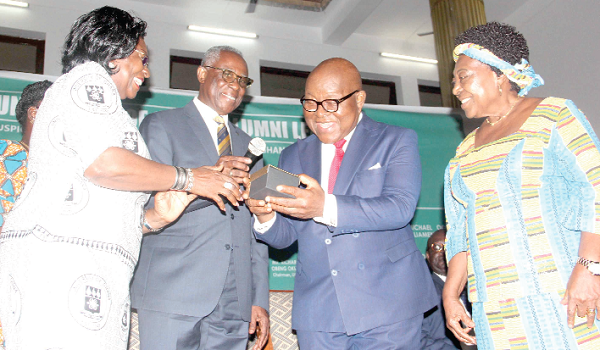
Speaker advocates West Africa Electoral Commission
The Speaker of Parliament, Prof. Aaron Mike Oquaye, has advocated the establishment of a West Africa Electoral Commission (WAEC) to organise all presidential and parliamentary elections in the sub-region.
Advertisement
The Speaker was delivering the 2018 University of Ghana Alumni Lecture in Accra last Wednesday.
It was on the theme: “Strengthening Democracy and Good Governance in Contemporary Ghana: Some Challenges”.
Functions of West Africa Electoral Commission (WAEC)
Prof. Oquaye said if the sub-region could cooperate to fight wars which sprang out of electoral conflict, “we should be able to cooperate to prevent conflict”.
He suggested that the sub-regional electoral body should assist with the registration of voters throughout West Africa and come up with a register common to the countries.
That, he said, would prevent double registration, saying: “In this, every name will appear once only.”
Prof. Oquaye said the proposed electoral body should also ensure that there were adequate ballot boxes, ink and other materials for every election in West
He said WAEC could also formulate rules and regulations, as well as apply global best practices in every election in West Africa.
Prof. Oquaye said the body could help in the establishment of electoral courts to punish criminal and civil matters.
“It will deal with any matter, which will promote transparency and confidence in all electoral practices in West Africa,” he said.
Decentralisation
Touching on decentralisation, Prof. Oquaye emphasised that the concept was essentially a power-sharing mechanism which produced countervailing authority and a liberating sense of local self-governance.
He recommended that metropolitan, municipal and district assemblies (MMDAs) be allowed to elect all their members, explaining that such a move would enhance the authority of the assemblies.
Prof. Oquaye said the nomination of one-third members of the assemblies by the Executive should be scrapped, suggesting that the seats be allocated to women who would contest separately to add to the number of women in the assemblies.
The Speaker again advocated the extension of the political party system to the MMDAs to ensure the election of metropolitan, municipal and district chief executives (MMDCEs) directly by the electorate to wean them from the Executive and be accountable to the people.
He said district assembly elections should be held two years separately from presidential/parliamentary elections and for a term of five years at each instance.
He suggested that the power of regional coordinating councils (RCCs) be drastically reduced since they naturally played to the central government and not the local governing authority.
Council of State
The Speaker, who spoke on a wide range of issues, also said the conceptualisation of the Council of State, as captured in the 1992 Constitution, should be reframed in line with the recommendation of the Committee of Experts which drafted the Constitution.
Prof. Oquaye said in terms of composition, the experts provided for “all former Presidents able and willing to act as members of the Council of State”.
“The era of personal idiosyncrasy should be over and we should include former Presidents and Vice-Presidents, except those who left office on impeachment,” he said.
Prof. Oquaye said membership of the Council of State should emphasise institutional representation, without a single nomination from any serving President.
He said the membership should include every former Chief Justice, every former Chief of the Defence Staff or General Officer Commanding the Ghana Armed Forces, every former Inspector General of Police, every former Governor of the Bank of Ghana, every former Speaker and Deputy Speaker, every former Majority and Minority Leader of Parliament, every former Auditor-General, the Secretary-General of the Trades Union Congress, 10 chiefs from the regional houses of chiefs,10 women nominated by the regional
Prof. Oquaye said the term of office should be six years and separate from that of the President.
Revised school fees
The Vice-Chancellor of the University of Ghana, Prof. Ebenezer Oduro Owusu, who also spoke at the event, appealed to Parliament to speed up the approval of revised school fees for public universities.
He said the delay was affecting the operations of public universities in undertaking certain important projects.
The Fees and Charges Act 2009 (Act 793), which was amended by Legislative Instrument 2228 in 2016, sought to safeguard the public against arbitrary and haphazard charges and levying of students by universities.
The act requires all vice-chancellors to seek parliamentary approval for whatever fees and levies they intend to charge before sending them out to students.
Prof. Owusu indicated that the University of Ghana had, since last year, placed a budget of GHc30 million before Parliament for approval and the delay in approving the fees would disrupt activities on the academic calendar of universities.
Utterances
The vice-chancellor cautioned politicians to be mindful of their utterances on radio and television when canvassing for votes.
“Language is extremely important; if we don't use the right language, we may realise at a point in time that we may be laughing at the wrong side of our mouth. We should allow decency to deepen the beauty of Ghana’s democracy,” he stressed.



